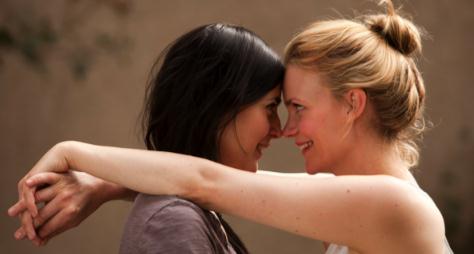Director Alexandra-Therese Keining’s film Kiss Me (Kyss Mig) is part of this year’s Inside Out Festival’s women’s spotlight series, which also includes Thom Fitzgerald’s film Cloudburst.
“People told me that it would ruin my career and so on,” says Keining. ”It was hard to find the money for financing it, though it stars some of Sweden’s biggest actors. I had a fantastic team and we managed to make a great film with very little money. When I talk about the budget in the US, people just laugh.”
Inspired after spending a spring in New York City, Keining knew she wanted to write a film about two women falling in love.
“I knew the story should have a positive vibe to it, unlike most lesbian-themed films,” she says. “When I finished the screenplay I met the film’s producer, Josefine Tengblad, who, just like Mia in the film, had gone through a similar experience. We knew right away that we needed to make this film happen.”
Kiss Me is an exploration of desire, need and truth. Mia (Ruth Vega Fernandez) and Frida (Liv Mjönes) are soon-to-be stepsisters meeting for the first time at their parents’ engagement soiree.
While Mia’s father, Lasse (Krister Henriksson) is set to marry Frida’s mother, Elizabeth (Lena Endre), Mia arrives at the party with her fiancée, Tim (Joakim Nätterqvist). Sparks fly when Mia and Frida get to know one another, and Mia must admit to herself, her soon-to-be husband and family that her sexuality isn’t what she thought.
“There’s really nothing new with the dramatic set-up of Kiss Me, which is also the point,” Keining says. “It’s a realistic love story with a very simple premise to it. The story is important because we need films with lesbian, gay, queer and trans themes to be accessed in an easy way, as well.”
Kiss Me‘s stunning cinematography depicts sweeping visions of southern Sweden, Stockholm, a darling Danish island named Fyn, and parts of Spain. It features music by Robyn and Jose Gonzalez.
“Hopefully one feels that it’s told with a genuine voice of trying to show that fragile state of falling in love, and the complications with those emotions,” Keining says. “It’s a love story about relations and acceptance, not only between two people, but also between parents and their children. Most importantly, the love for one’s true self. The film grapples with love, betrayal, lesbianism and relationships.”

 Why you can trust Xtra
Why you can trust Xtra


